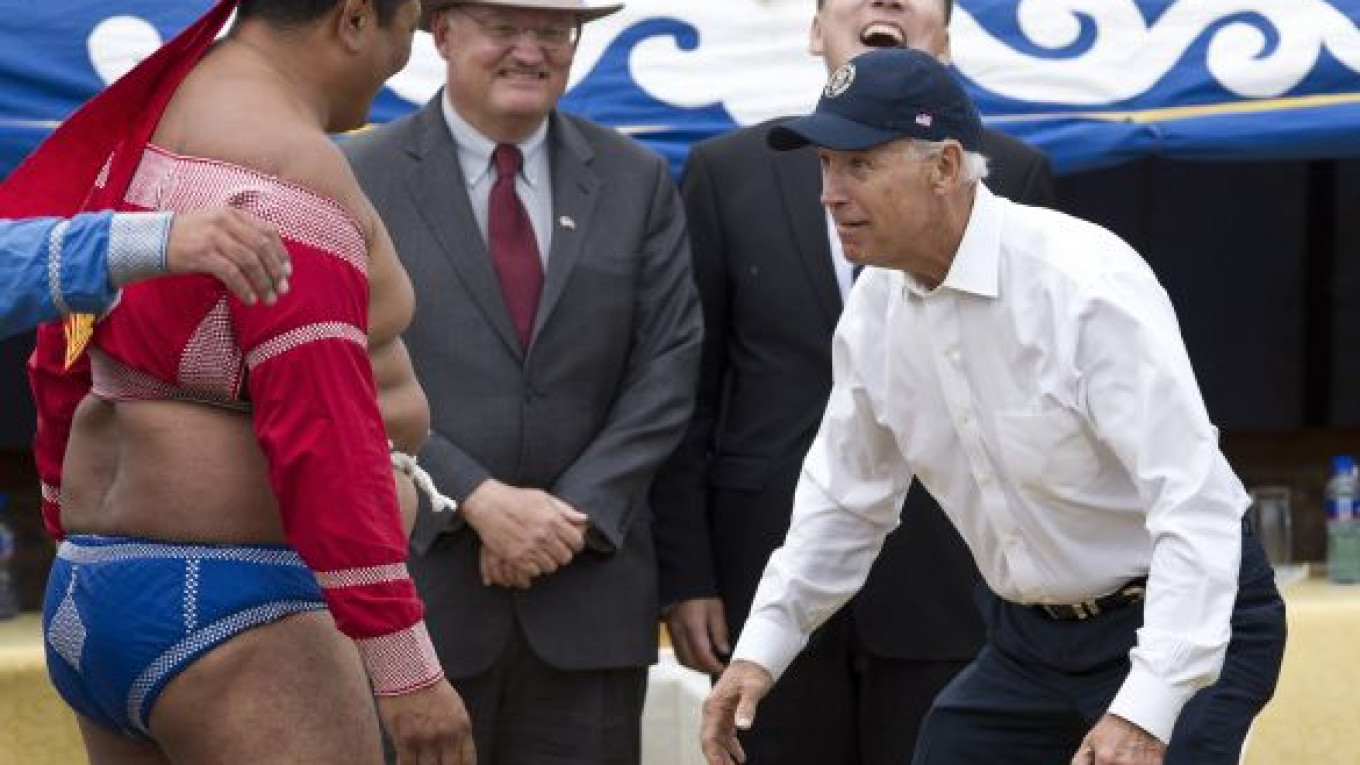ULAN BATOR, Mongolia — U.S. Vice President Joe Biden tried his hand at archery, watched a wrestling match and named a horse during a brief visit Monday in Mongolia, which he called a shining example of democratic development.
Biden, arriving from China for a six-hour trip before going on to Tokyo, praised Mongolia for embracing democracy following decades of domination by the Soviet Union.
"In the last 20 years Mongolia has captured the imagination of the world by its remarkable transition to democracy," Biden said.
Mongolia was ruled as a one-party satellite of the Soviet Union for much of the last century. After seven decades of Communist rule, Mongolia held its first free multiparty elections in 1990. But its transition to democracy has had rocky patches. In 2008, a disputed election led to rioting on the streets of Ulan Bator in which at least five people died.
Later Monday, Biden sat under a traditional Mongolian tent with Prime Minister Sukhbaatar Batbold and other officials as they watched traditional dance and throat singing performances.
He tried his hand at using a traditional bow and arrow and watched a wrestling competition. As he presented an award to the hefty winner, Biden struck a wrestling pose, eliciting laughter. Biden was also presented with a Mongolian horse, which he named "Celtic" in remembrance of his Irish roots, though the horse bucked as the vice president tried to get near.
Biden also praised Mongolia's military contribution in Afghanistan and Iraq after meeting Prime Minister Sukhbaatar Batbold and President Tsakhia Elbegdorj.
In 2005, George W. Bush became the first U.S. president to visit the country and thanked Mongolia for supporting the Iraq war and hailed its progress to democracy. Mongolia sent some 120 soldiers to support U.S. troops in Baghdad in 2003, and it has also sent peacekeepers to other parts of the world.
“Americans admire and appreciate Mongolia’s contribution to international peace and security,” Biden said.
Jargalsaikhan Dambadarjaa, a Mongolian economist and political commentator, said his country felt more political kinship with the United States than China or Russia. “The relationship with the United States is very important for this country because we are in the middle of these two giants,” he said.
A small group of demonstrators, however, greeted Biden’s motorcade with posters saying, “Yankees keep your hands off Mongolia” and “Hi Joe, No Nuclear Waste, Go Home.”
There have been reports in the capital of secret discussions between the Mongolian, Japanese and U.S. governments on storing nuclear waste in Mongolia. The Mongolian government has denied the rumors.
Ulan Bator has been keen to cultivate new relationships with what it calls “third neighbors” like the United States, though China dominates Mongolia’s economy, buying 90 percent of the country’s exports in the first half of 2011.
Batbold thanked Biden for U.S. support, saying he hoped for closer economic ties. “We have discussed the possibilities to develop and enrich trade and economic relations with the United States and attract more United States investments to Mongolia,” he said.
Mongolia sits on vast quantities of untapped mineral wealth, and foreign investment in gigantic mining properties is expected to transform its tiny economy in the next decade. But after years on the fringes of the Soviet bloc, the land-locked country is developing its economy almost from scratch, and foreign investors need to know whether its democratic government can maximize growth while handling the pressures exerted by Russia and China. Last month, Mongolia picked U.S. mining giant Peabody Energy, China’s Shenhua Group and a Russian-Mongolian consortium to jointly develop the keenly sought Tavan Tolgoi coking coal deposit in the Gobi Desert.
(Reuters, AP)
A Message from The Moscow Times:
Dear readers,
We are facing unprecedented challenges. Russia's Prosecutor General's Office has designated The Moscow Times as an "undesirable" organization, criminalizing our work and putting our staff at risk of prosecution. This follows our earlier unjust labeling as a "foreign agent."
These actions are direct attempts to silence independent journalism in Russia. The authorities claim our work "discredits the decisions of the Russian leadership." We see things differently: we strive to provide accurate, unbiased reporting on Russia.
We, the journalists of The Moscow Times, refuse to be silenced. But to continue our work, we need your help.
Your support, no matter how small, makes a world of difference. If you can, please support us monthly starting from just $2. It's quick to set up, and every contribution makes a significant impact.
By supporting The Moscow Times, you're defending open, independent journalism in the face of repression. Thank you for standing with us.
Remind me later.






